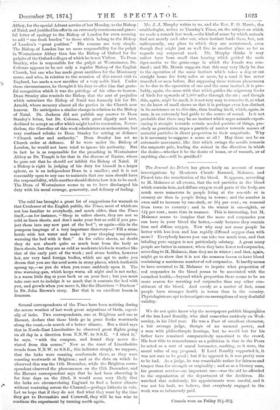Mr. J. J. Murphy writes to us, and the Rev.
F. 0. Morris, the ornithologist, writes to Tuesday's Times, on the subject on which we made a remark last week,—the kind of sense by which animals find not merely each other out, when instinct leads them, but, not unfrequently, any place to which they are accustomed, even though they might just as well live in another place so far as regards any corporeal need. Mr. Murphy thinks it may rather have been smell than hearing which guided the male tiger-moths to the gauze-cage in which the female was con- fined ; and Mr. Morris suggests that this may very likely be due to the operation of the same instinct which takes a dog or cat straight home for forty miles or more, by a road it has never travelled or seen before. But supposing these various phenomena to be due to the operation of one and the same instinct., it is pro- bably, again, the same with that which guides the migratory flocks of birds for upwards of 1,000 miles through the air ; and though this, again, might be smell, it is not very easy to conceive it, as what we do know of smell shows us that it is perhaps even less distinct in its assistance as to direction, than hearing itself, which, again, in man, is an extremely bad guide to the source of sound. Is it not probable that there may be an instinct which urges animals experi- encing it straight towards certain needed qualities of things, pre- cisely as gravitation urges a particle of matter towards masses of material particles in direct proportion to their magnitude. Why is it necessary to suppose a sense at all ? May there not be an automatic movement, like that which swings the needle towards the magnetic pole, leading the animal in the direction in which the desire—whether it be the desire of home, or of warmth, or of anything else—will be gratified?


































 Previous page
Previous page